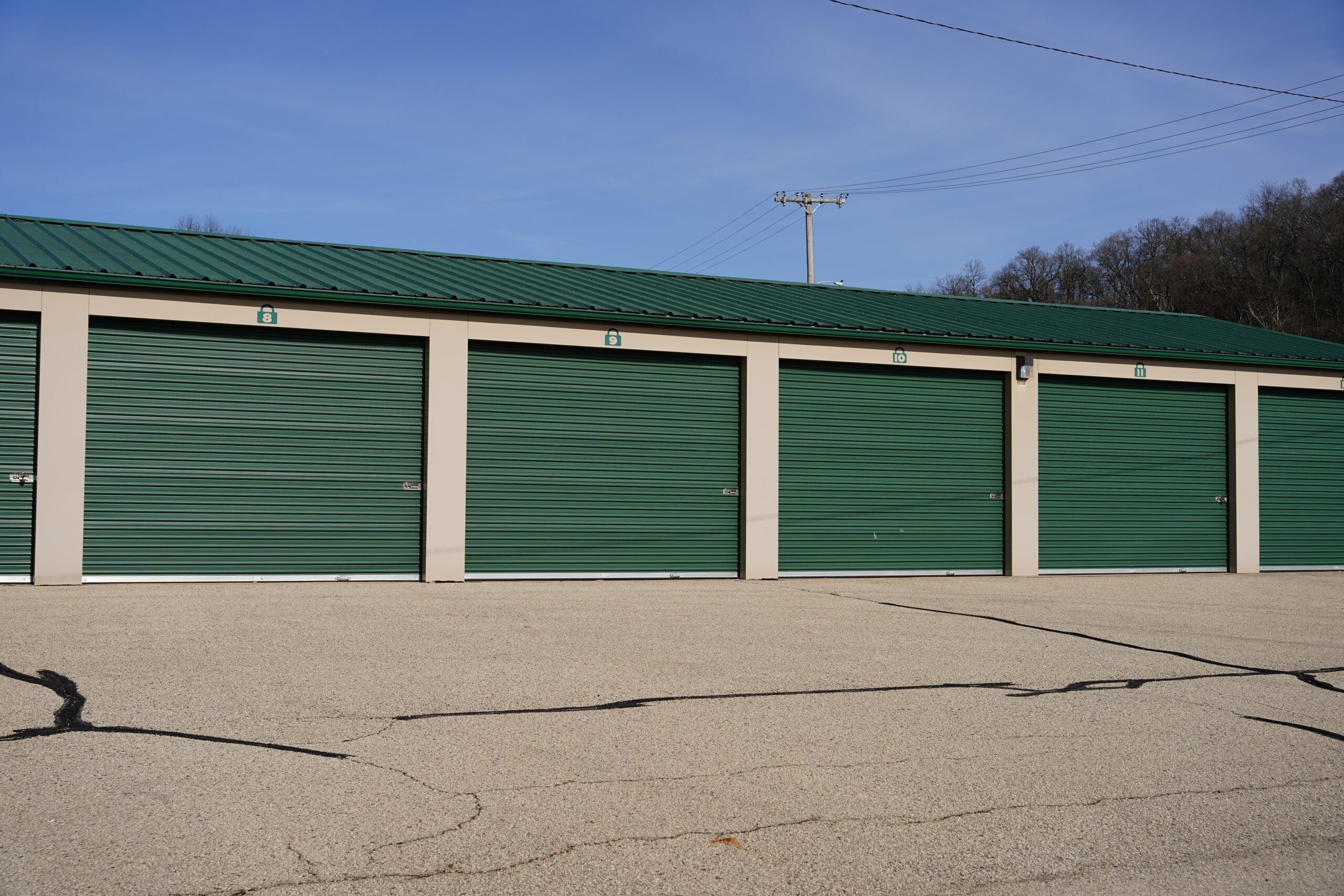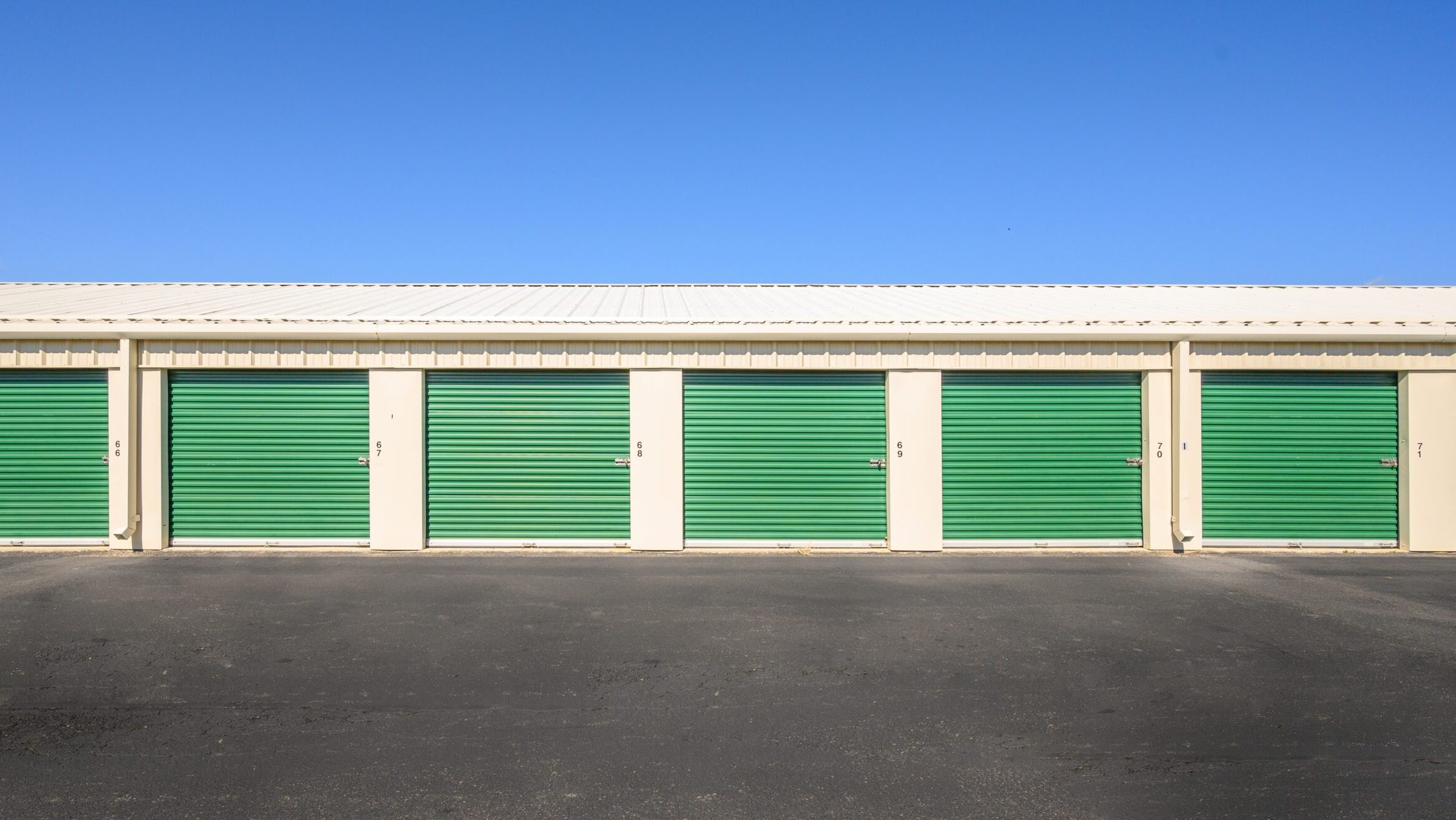Key Takeways
- Self-storage units provide flexible e-commerce storage solutions that allow businesses to scale operations as they grow via size-upgrade options without long-term commitments.
- Storage units give e-commerce businesses space to employ efficient inventory management systems for handling excess inventory, seasonal products, and high-value items with refined organization methods.
- Storage units can function as e-commerce fulfillment centers with space for packaging stations and shipping supplies, offering a cost-effective alternative to traditional e-commerce warehousing solutions.
- Self-storage facilities offer valuable security features for e-commerce inventory, including surveillance cameras, alarms, and electronic access control systems that protect your valuable merchandise.
E-commerce businesses have never had more potential than they do right now.
Whether we’re busy working from home or constantly on the go, ordering goods online is the primary way most of us get what we need, conveniently delivered to our homes or offices.
But what may start as a hobby or small business can quickly explode into a full-fledged operation. Fulfilling orders and processing returns from the garage may seem plausible at first, but it doesn’t leave you room to scale up fast. And the rate at which your e-commerce business multiplies is often beyond our control–even if it is a great problem.
A lack of space and a rapid inventory turnover can work together to overwhelm even the most rigorous e-commerce company models.
But don’t fret–this handy guide offers e-commerce storage solutions that are affordable, practical, and leave room to grow.
We’ll share inventory storage solutions that keep your e-commerce inventories safe while providing methods for processing returns. We’ll also compare and contrast renting an accessible storage unit with the pros and cons of bulk storage solutions.
Finally, we’ll include some info on how Storage.com can help you find affordable e-commerce storage locations near you. A storage facility typically offers different-sized units, which means you can simply upgrade your e-commerce operation to a bigger size storage space as soon as the business starts to grow.
First, let’s take a closer look at e-commerce storage solutions for inventory management.
E-commerce Storage Hacks: Using Self-Storage Units for Inventory Management

Maybe you’re running a business-to-business model. Or maybe you’re a painter, a musician ordering crates of freshly pressed vinyl, an author self-publishing books, or a creative running an Etsy shop-type setup. Regardless, the business owner’s role changes as rapidly as the business.
You might not have much inventory in the early days as you’re making products to order. As the business starts to grow and you’re first creating a backstock, you’re probably still able to store your inventory at home in the basement, garage, attic, spare room, etc.
However, if you’re playing your cards right, your e-commerce business will eventually run into the best problem any small business can have–outgrowing your home. At this point, it’s time to start looking for some offsite inventory storage options, such as a fulfillment provider, warehouse, or self-storage facility.
Is E-Commerce Warehousing Right For You?
E-commerce warehousing is an expensive option that’s really only suitable when you’re attempting to store a vast product inventory. And fulfillment centers force you to sacrifice control over your packaging process while raising the costs for both your consumer and you.
These options may make sense for large-scale, multifaceted operations, but there’s a middle path between third-party warehouse services and running your business operation from home–a self-storage facility.
Establishing a streamlined system for inventory management is a critical component of any successful e-commerce business. Not only does utilizing an offset storage unit for your bulk product storage help minimize waste and lower your costs, but it also helps you keep track of what needs to be restocked.
Using a storage unit as an e-commerce storage solution allows you to track turnover rates and demands for each product you offer. Combining a systemized inventory layout with easy-to-use inventory management software gives you a bird’s eye view of the whole process.
And the visibility you gain from managing your own inventory storage space provides invaluable insight into the restocking, fulfillment, and return processes you’d never get from a third-party fulfillment service, especially early in the game.
Putting your own hands on every part of the process–from product creation to order fulfillment to customer service–gives you control that the largest business owners might not have.
But how do you know when it’s time to take that at-home business inventory to a self-storage unit? Let’s take a look at the earliest indicators.
Excess Inventory
The first sign you’ve outgrown your at-home e-commerce business operation is an excessive backlog of product inventory. One of the hardest mountains e-commerce business owners have to climb is keeping their growing inventory organized. And if you fall behind on that climb, the resulting chaos can slow down your whole process from product creation to order fulfillment.
The good news is that storage units come in a variety of sizes, allowing you to start with a smaller unit and upgrade as your business expands. Storage facilities offer various business storage options, including security cameras, on-site personnel, 24-hour access, and climate-controlled storage units.
- We suggest renting a small storage unit as soon as you have excess inventory, as an offsite unit dedicated to product storage provides more room for product organization and fulfillment/return processing.
- Set up metal shelving and use storage containers or crates to create a streamlined inventory storage system.
- Label everything and make a map of your inventory to help monitor product turnover.
Moving your excess product inventory to self-storage space allows you to keep it clean and organized, increasing your productivity and visibility.
Seasonal Inventory
Maybe your e-commerce business is a clothing boutique that rotates your product output with the seasons. Or maybe your product demand changes during peak shopping seasons, holidays, and seasonal sale events. Either way, using self-storage as a bulk storage solution gives you the space and flexibility to keep up with these shifting trends.
Moving your seasonal inventory into a storage facility frees up studio space for creating new products. It also gives you a bird’s-eye view of your backstock when the items in storage are back in season. This ensures you’re not making products you already have stashed away from last year.
Utilizing a self-storage facility for your seasonal e-commerce storage solution frees you up to handle order increases without infringing on customer satisfaction rates.
- Many types of e-commerce businesses make timely products that only sell during particular holidays, such as Halloween, Christmas, and religious holiday-inspired items.
- Keeping your seasonal inventory in a self-storage unit frees up extra space in your main work and storage space.
- When the seasons change, you simply move the relevant products into your workspace and throw the now-out-of-season inventory into the storage unit.
Keeping your seasonal inventory offsite and ready to go allows your e-commerce business to fluctuate with the market demands without missing a beat!
High-Value Items
Whether or not you have an insurance plan that covers your business inventory in the case of product theft or damage, the time an unfortunate incident wastes can put you in the hole.
What’s more, insurance companies are looking for a reason not to pay you out for your damages. And if they hear you were keeping your backstock in the basement or in your car at the time of the incident, they might find the excuse they’re looking for.
Shared warehouse and office spaces leave your valuable inventory items vulnerable to accidents and theft. But if you keep your high-value items in a secure storage unit, only you, the e-commerce business owner, will have access.
Your online business’s inventory will be kept behind a double-locked door, monitored by security cameras, and guarded by on-site security. Other storage facility security features include motion sensors, flood lights, and a locking gate requiring a key code just to get into the parking lot.
Another feature you can take advantage of to keep your e-commerce business’s high-value inventory safe is electronic Bluetooth access control systems. These automated smart entry systems lock from the inside, so there’s nothing a would-be thief can break into, even if they did get past all the preceding security measures.
- Storage units employ alarms on the doors of each storage building and, in some cases, on the doors of the individual units as well.
- While not all storage facilities are created equally, you can use our Storage.com amenities filter search tool to isolate units near you that have alarms, security surveillance, drive-up access, and climate-control units that’ll guard your goods against all potential threats.
- Some facilities even offer insurance policies that cover the costs of damaged and stolen items.
The serious security precautions many self-storage facilities employ make a storage unit the ideal place to keep your high-value inventory items.
Using Self-Storage as an E-commerce Storage Unit Fulfillment Center

As you probably already know, when it comes to fulfilling e-commerce orders, speed matters. Thanks to the effects of massive e-commerce operations like Amazon, online business customers have less tolerance for long delivery times than ever.
A well-organized bulk storage system run from a business storage unit gives you space for the organization you need to find the items you need and ship them quickly and accurately to their customer destination.
An e-commerce storage unit offers multiple benefits for fulfillment, especially if it’s a unit with electricity. Using shelves and labeled containers and updating your inventory map lets you grab what you need on the fly.
Locating and packing your items quickly gives you more time to spend on the creative and fun sides of running your business. And ample space for streamlined organization ensures you’re shipping the right items to the right customers.
Getting your customers their orders as fast and accurately as possible is a great way to keep your review scores high, making your online store more attractive to new and repeat customers.
The Benefits of a Self-Storage Investment Center
You can boost your efficiency even more by setting up a fulfillment station right there in your storage unit, where you can package and prep your items for shipping. You can make things even easier on yourself or your small fulfillment team by storing your most popular products closest to the packing station.
As your business gets more and more popular, order fulfillment can get harder to keep up with. Using self-storage as an e-commerce storage solution gives you the extra space required for constantly updating your fulfillment system by adding and eventually expanding a stockroom.
You want to keep your systems organized. Remember, as your business scales up, whatever systems you have in place are the systems that will be expanding. If your systems are chaotic when your business is small, it’s the chaos that will multiply as the business grows.
But if you’ve implemented a streamlined fulfillment strategy from the beginning, scaling up your business is as simple as upgrading to a larger storage unit with the extra space you need for holding more inventory and fulfilling more orders.
Let’s take a closer look at how to choose a self-storage facility as the ideal solution for keeping your shipping supplies handy, set up, and ready for action.
Getting Packaging and Shipping Supplies From Your E-commerce Storage Facility
As your e-commerce business grows, your shipments will get larger and more frequent. Another bonus feature of using a commercial storage facility as your home base is the ancillary self storage products.
More than a few storage facilities out there sell packaging and shipping products such as bubble wrap, packing paper, packing tape, and even shipping boxes right at the front desk.
You can save time and money by setting up a packing and shipping workstation inside your storage unit. When you’re low on packing supplies, you just walk to the front desk and re-up.
By making a fulfillment center right next to your product inventory, you’re cutting down travel time and bypassing numerous middle steps. You can schedule daily pickups right from your storage facility or find a storage unit close to a post office.
And it’s not just the shipping method that your e-commerce storage unit simplifies. Let’s consider how a storage unit can help you streamline your online business’s return and exchange processes.
How a Storage Facility E-commerce Warehouse Helps with Return Processing
An offsite storage facility lets you maximize your e-commerce storage space, leaving plenty of room for packing materials and processing returns.
Some storage facilities are specifically marketed and licensed as business and commercial storage solutions. Many of these commercial storage facilities let you receive mail and packages. Others will actually accept deliveries on your behalf.
If you give them your permission, they can use a spare key or access code you provide to actually put your returned item package in your storage unit for you. That way, the returned item will be ready for you to process and exchange as soon as you get there.
NOTE: The facility may or may not charge a fee for accepting your e-commerce storage deliveries, and the level of protection may vary. If they charge a fee, they assume “ordinary care” of your packages, meaning they’re responsible for protecting the packages from damages or loss. If they don’t charge a fee, they may only be responsible for “gross negligence,” meaning they’re only responsible for your package if you can prove there was conscious disregard.
If you can’t receive returns directly to your unit, you can use your zip code to find a storage unit located close to your business’s PO box.
Once you receive the returned item, simply swing by your storage unit, refile the exchanged item back into your inventory, package up the replacement item in your fulfillment corner, and pop back by the post office to send it where it needs to go.
E-commerce Self-Storage Units vs. E-commerce Warehouse
We’ve explored many of the benefits of using self-storage as an e-commerce hub. But how does a climate-controlled storage unit HQ compare to a traditional warehouse?
There are practical considerations for choosing a storage unit, such as motion-sensor flood lights, coded entry gates, security cameras, lower operational costs, preventative pest control paid for by the storage facility, and 24-hour access.
Let’s zoom in on the details with a nuanced comparison that helps you decide on the ideal e-commerce storage solution.
Drawbacks and Benefits To E-commerce Businesses in Storage Units and Storage Containers:
For starters, let’s compare the storage rental options. You can rent a storage unit within an indoor facility or a storage container you can drop in your backyard. We suggest finding a storage facility for commercial use so you are not hit with roadblocks as your business expands.
- For starters, the monthly rate of renting a storage unit or portable storage container is significantly lower than the cost of renting a traditional warehouse space.
- Your storage space is yours and yours alone. That means you’re free to organize your inventory and update and refine your ordering, packaging, and shipping processes as needed without having to consult anyone else.
- Storage units can be organized into different areas for different functions. We already mentioned the benefits of using shelves to organize your inventory and setting up a fulfillment station. But you can also use a filing cabinet to keep track of all your e-commerce company records and documents.
- Many storage facilities have all the packing and shipping supplies you need available for purchase at the front office.
- Renting an e-commerce storage unit means the storage facility is responsible for routine maintenance and repairs.
- When your business grows, you can simply upgrade to a bigger unit–leases are limited, and there are minimal long-term commitments. You might only need a 10-footer now, but in a few months, if you find yourself running out of space, many facilities will let you transfer your lease to a larger unit. Swapping to a larger warehouse space isn’t nearly as simple.
- In addition to the maintenance and repair services mentioned above, renting an e-commerce storage unit gives you access to customer support.
- Depending on the facility you choose, your low monthly cost can include package delivery services, professional mover help to relocate your equipment to a new unit, and 24-hour security features. You’ll have to pay a security guard to protect your private warehouse space, which is expensive.
Drawbacks and Benefits of Warehousing Your E-commerce Storage:
Now, let’s look at the pros and cons of utilizing warehouse spaces for e-commerce storage by examining the various available warehouse storage options.
- The most popular choice is to rent a warehouse all to yourself, which gives you complete control over your company space but also comes with the added responsibility of large space management.
- If your e-commerce company is booming enough to warrant a private warehouse space, you will likely need warehouse staff to help out.
- You can also rent a shared warehouse space within a larger warehouse, where your business is one of many operating within a communal eCom warehouse space. This lowers the rent cost but also means you’re tiptoeing around other companies.
- Whether you’re renting an entire warehouse for your company or you’re sharing the space, it gives you more space than a storage unit, but at a much higher price.
- There’s also what’s called a third-party fulfillment center. You drop ship your products to the fulfillment center for bulk storage, and the fulfillment center staff does all the packing and shipping on your behalf.
- A fulfillment center is a great way to branch out without increasing shipping times. For example, if your online store is based in Texas, but you’re receiving more and more orders on the East Coast, you can employ a fulfillment center in New York to cut your shipping times in half, boosting customer satisfaction.
- That said, contracting through a fulfillment center requires keeping the fulfillment center stocked in advance. That means you’re making and shipping products out without any guaranteed pre-sales. You absorb the shipping cost, and there’s no guarantee that the bulk batch of products you’re paying to ship will sell.
- Third-party fulfillment operations are a convenient way to offload the tedious task of order fulfillment and returns processing onto a warehouse crew that’s managing orders for multiple companies at once, streamlining the process and shortening your online store’s shipping times. That said, you give up control over customer service and the ordering process.
How Storage.com Can Help with E-Commerce Storage
Using self-storage as an e-commerce storage solution provides your online business with an affordable and manageable alternative to expensive warehouses that leave plenty of room for upscaling as your business grows.
Outgrowing your at-home e-commerce storage system is a good problem for an online store to have. And self-storage facilities provide security features, maintenance and repair support, order fulfillment supplies, and 24-hour access at no extra cost.
Having your hands on every aspect of the process, from product creation to order fulfillment and customer service, provides you with invaluable experiential knowledge that not every business owner has. Plus, having your own personal e-commerce storage space lets you refine and streamline your process at every level.
But how do you find a storage unit that has all the amenities you need for e-commerce storage? You’ll definitely want proactive pest control, security cameras, and alarms. And depending on the type of products you’re storing and selling, the need for climate-controlled storage might be a non-negotiable.
Lucky for you, Storage.com is here to help.
Storage.com lets you browse and compare self-storage units using amenity filters that isolate the storage facilities in your areas with all the ideal storage features your e-commerce company needs.
Just punch your zip code into our handy Storage.com search tool, and you’ll see what we mean.
We’ll filter through the thousands of local storage facilities for you, making it easy to find the storage unit that best fits your online business’s needs.
Whether you’re looking for a storage unit with climate control, electricity, alarms, 24-hour access, drive-up access, or security cameras, Storage.com makes the process quick and painless.
All you have to do is choose a storage unit and your move-in date, and we’ll take care of the rest. And if you have any questions about commercial or business storage this guide didn’t answer, feel free to ask. Our storage representatives are just a phone call away!






